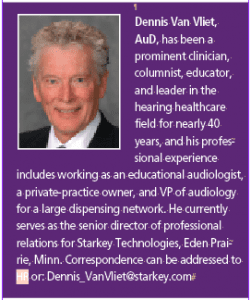Hearing Review September 2014
By Dennis Van Vliet, AuD
We have an old dog named Shaggy. She is 17 and a half years old. From what we understand, that is old for a bigger stature dog like a golden retriever. We know that she has cataracts and can see very little out of one eye, has what appears to be a moderate hearing loss in her better ear, and a severe to profound loss in the other. The worst part lately is that she cannot get up by herself if she is lying down on anything but a nonskid surface like a carpet. Her hips are so bad that any deviation in the grip of her front paws causes her to collapse.
As bad as that sounds, she adapts and proceeds with as much dignity as she can muster. As a result of the asymmetric hearing loss, she inevitably localizes to the better side when we shout loud enough for her to hear us. When she’s wrong, she compensates pretty well by looking in the other direction. If she collapses, she manages to look dignified, and makes eye contact to let us know that she needs a little help. She still enjoys eating twice a day, and routinely dances a little jig on the carpet in the morning, apparently to celebrate the fact that she’s made it through another night. We have adapted to her needs and appreciate the fact that she remains an affectionate companion pet like she has always been.
I can’t help but think that there are some lessons to be learned from her. If we have been in practice for any length of time, we all can think of patients who are facing a number of limitations. Some are distraught by the concept that something is wrong, and do everything they can to fix the problems they encounter, and some are content with adapting to a new reality that includes their limitations.
Our job is to figure out where their head is so we can guide them appropriately. If they are intent on fixing the problem, our first challenge is getting them to a middle ground so they will appreciate the fact that we cannot fix a problem but that we can treat it, and improve their situation. If they are too content with their situation, and driving everyone around them nuts, we need to try to steer them to a place where they understand that acceptance is good up to a point, but that ignoring treatment options can limit their quality of life.
Because of the nature of clinical work that much of us do, the people we see for assessment and treatment typically are not the content ones, but those looking for information or treatment. We are reasonably well equipped to attract and provide useful services to many of these individuals. Some fall away from the treatment cycle for a variety of reasons, and we wring our hands, and do what we can to get them back in.
What about the others? The good natured folks who simply turn up the television, accept their situation like they accept other problems in life, and compensate as best as they can? I remember one person who I knew when I was a child. She and her husband ran an independent grocery store in the rural-agricultural town where I grew up in the 1950s, Yorba Linda, Calif. After I set up a private practice in the town decades later, she came to see me because cerumen occlusion had created a problem that she couldn’t ignore. Once the cerumen was removed, she still had a bilateral 40 dB loss, but was unfazed, and didn’t want to do anything else about it. She was very grateful for the improvement that treating the cerumen occlusion offered, but was satisfied with her performance with the residual hearing loss, and never adopted hearing aids.
Her example wasn’t denial, or a symptom of a financial problem. She simply didn’t feel the need to do anything more than compensate the best way she could. I felt that I had satisfied my personal and professional obligation to her. I was disappointed that she didn’t want help beyond what I provided, because I thought I knew what it would do for her and her family. I realized, however, that I couldn’t get inside her head and make decisions for her—and didn’t have the right to do so. She and people like her are free to make decisions on their own with their significant others and our obligations are only to make sure that they have all the information they need to make their decisions.

Original citation for this article: Van Vliet D. Facing limitations. Hearing Review. 2014;21(9):50.




